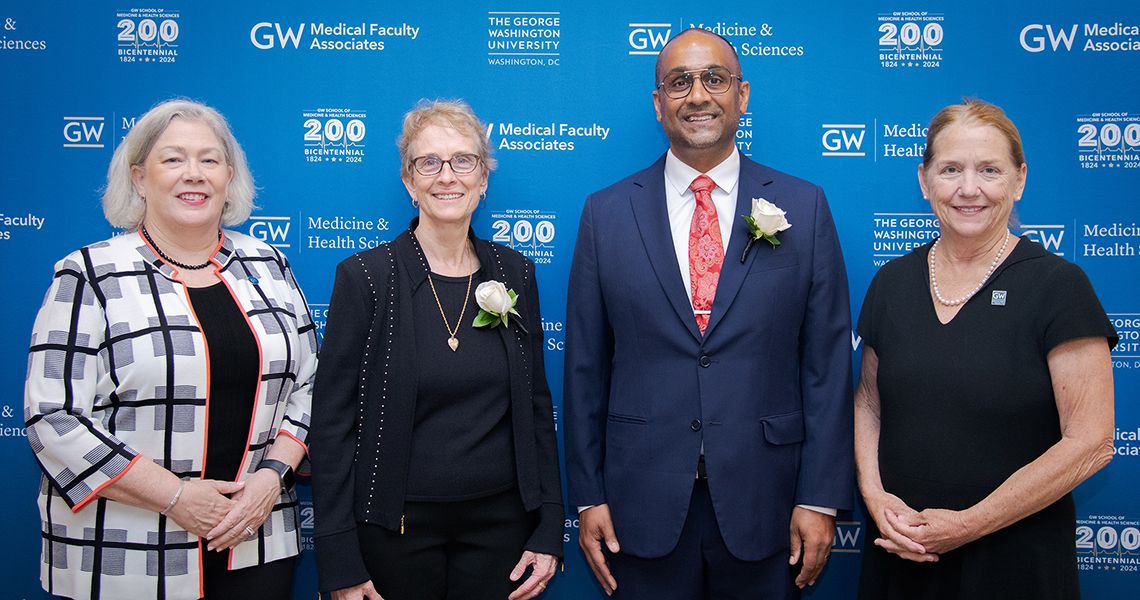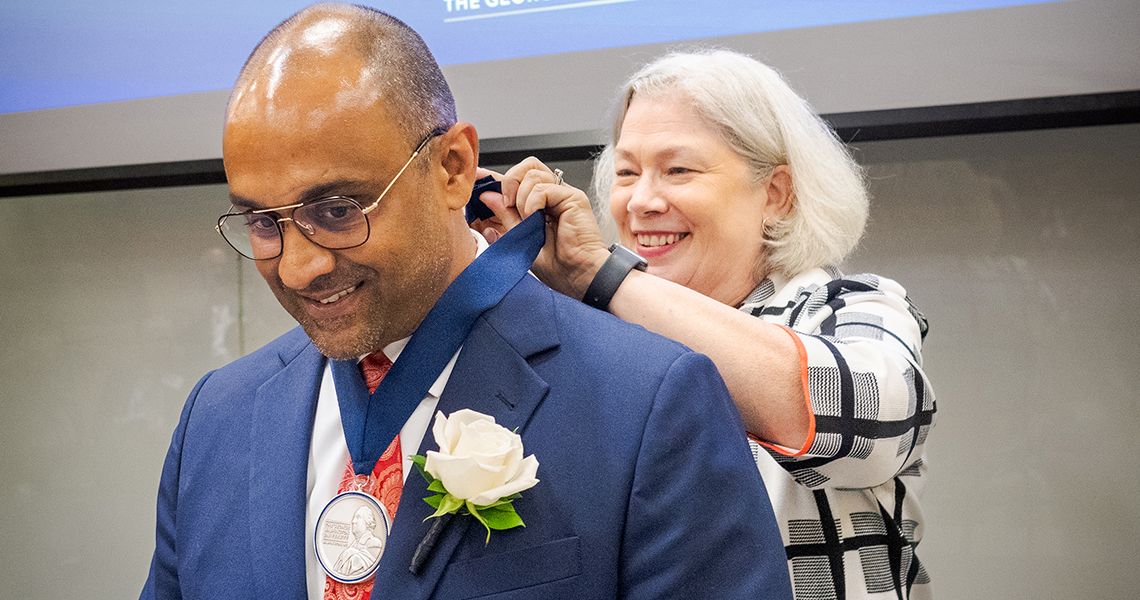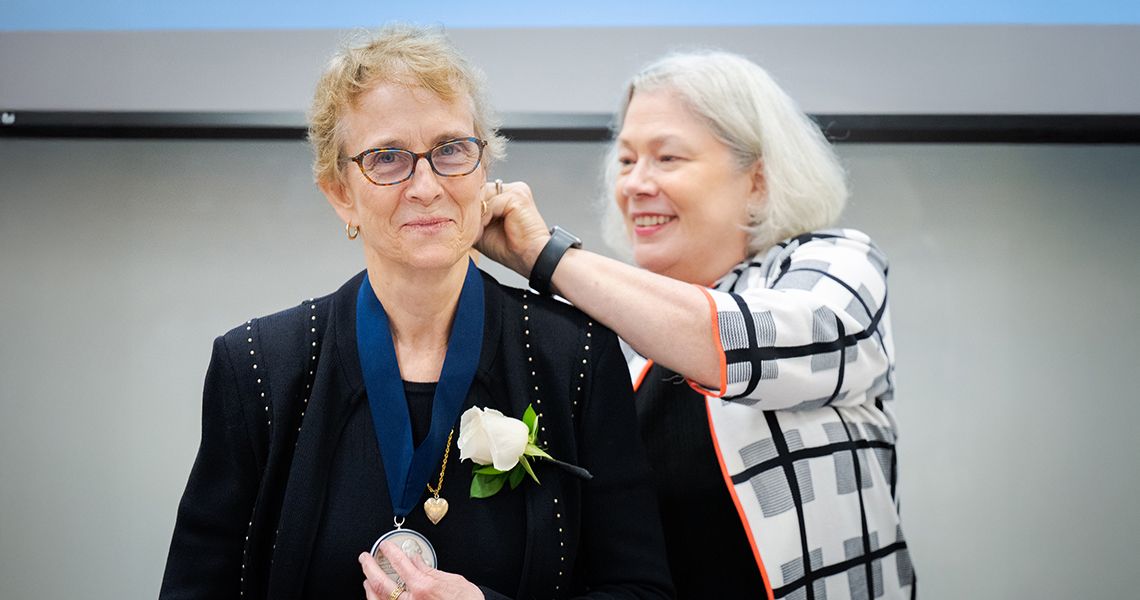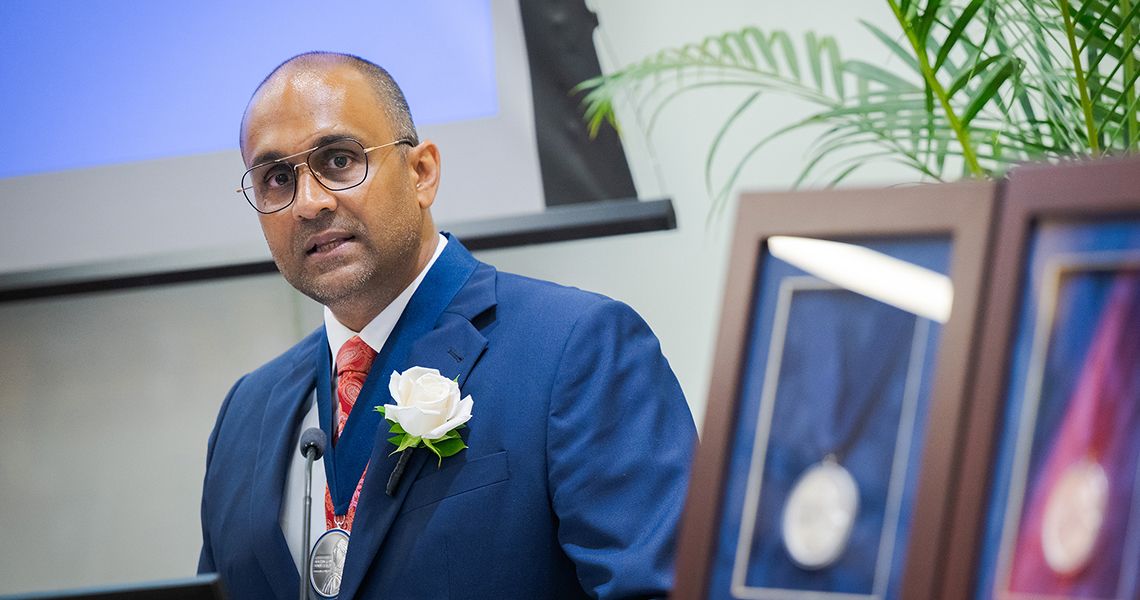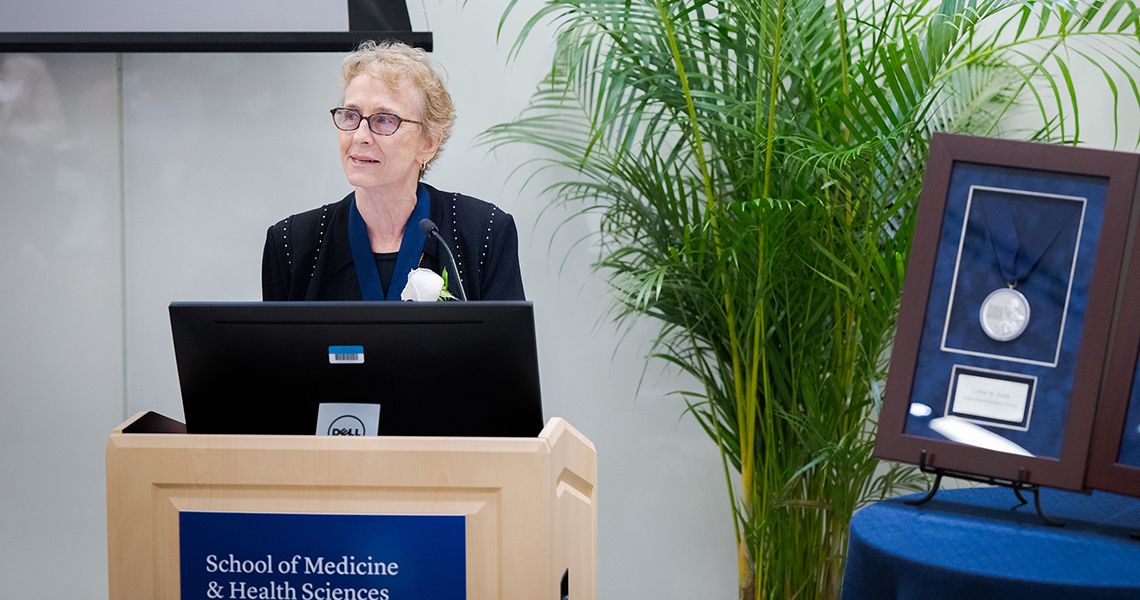The George Washington University School of Medicine and Health Sciences (SMHS) recently honored a pair of accomplished faculty members, Sharad Goyal, MD, and Christina M. Puchalski, MD ’94, RESD ’97, for their academic excellence and leadership in patient care by formally bestowing them with endowed professorships on June 30.
Barbara Lee Bass, MD, RESD ’86, vice president for health affairs, dean of SMHS, and the Walter A. Bloedorn Chair of Administrative Medicine, and professor of surgery, praised the honorees for their lasting impact on the university and the community.
“With each of our vital endowed professorships, we recognize and support outstanding faculty who propel GW to be an internationally recognized leader in patient-centered care, educational excellence, and transformative research,” said Bass.
GW President Ellen M. Granberg, PhD, reflected on the role of endowed professorships in advancing medical science and education. “This installation comes at a time when the world is acutely aware of the importance of trusted expertise, rigorous research, and institutions that deliver evidence-based solutions,” she said. “At GW, particularly through the School of Medicine and Health Sciences, I think we have embraced that responsibility locally, nationally, and globally.”
Endowed professorships, Granberg added, are among the highest honors a university can bestow. “They provide a permanent foundation of support, empowering scholars to push boundaries, mentor future leaders, and deliver real-world solutions to society’s most urgent health challenges.”
The ceremony underscored the importance of investing in academic medicine and highlighted the contributions of two faculty members whose careers have shaped their fields. For both Goyal and Puchalski, the recognition serves as both a professional milestone and a platform to help advance the school’s mission of patient care, education, and research.
Goyal, a professor of radiology and interim associate center director for clinical research at the GW Cancer Center, was installed as the inaugural Luther W. Brady Professor of Radiation Oncology. Since joining SMHS in 2017, Goyal has expanded the Cancer Center’s clinical expertise in radiation oncology, and led advancements in clinical operations and translational science, directly impacting patient outcomes. He is noted for his use of intensity-modulated radiation therapy, stereotactic radiosurgery, stereotactic body radiotherapy, and proton beam therapy for patients with primary and metastatic solid tumors.
Named in honor of Luther W. Brady Jr., MD ’48, a three-time GW alumnus and pioneer in radiation oncology, the professorship reflects Brady’s legacy as a clinician, researcher, and patron the arts and his alma mater. Throughout his career, Brady helped establish new standards of care for several cancer types and supported GW through service on the Board of Trustees and the SMHS Dean’s Council.
“To receive an endowed professorship is without a doubt the pinnacle of a career in academic medicine,” Goyal said. He reflected on Brady’s legacy as a visionary in the field. “Dr. Brady wasn’t just any radiation oncologist, he was a giant, one of the world’s foremost radiation oncologists who pioneered the organ preservation movement of oncology. His efforts established standards of care in breast cancer, eye tumors, and cervical cancer that have endured the test of time.”
In his remarks, Goyal credited his achievements to the foundation laid by his family and offered heartfelt thanks to his wife, Seema, and their sons, Shiv and Ishaan. “I hope you keep working hard, follow your dreams, and stand up for what’s right,” he said.
Puchalski was installed as the Eugene Meyer Professor of Medicine. A two-time GW alumna and the founder and director of the GW Institute for Spirituality and Health (GWish), she is widely considered a pioneer and international leader in the movement to integrate spirituality into health care in clinical settings and medical education.
The Meyer professorship was endowed in 1955, in honor of noted financier and philanthropist Eugene Meyer, who served as the fifth chair of the Federal Reserve, first president of the World Bank, and publisher of The Washington Post.
Since the institute’s founding in 2001, Puchalski’s work at GWish has had far-reaching impact. Under her leadership, the institute developed tools such as the FICA — or Faith/Beliefs, Importance, Community, Addressed in Care or Action — spiritual history model, now used widely in clinical settings. Today, three quarters of U.S. medical schools incorporate some form of spiritual care into their curricula. Her Interprofessional Spiritual Care Education Curriculum (ISPEC) program trains interdisciplinary health care teams to address the spiritual needs of patients and their families. In 2023, GWish received a $3 million grant from the John Templeton Foundation to support a 10-year initiative aimed at embedding spiritual care into health systems.
“Today I stand in front of you with such deep gratitude,” said Puchalski. “This professorship is not only recognition of my work, but of the essential role that spiritual health plays in the care we provide to patients and their loved ones.”
Emphasizing the broader purpose behind her work, she said, “We are all bound here in this room by something deeper than our professions or our culture. This is the root of the spirituality and health movement: to be present, to listen deeply, to serve and to love.”
